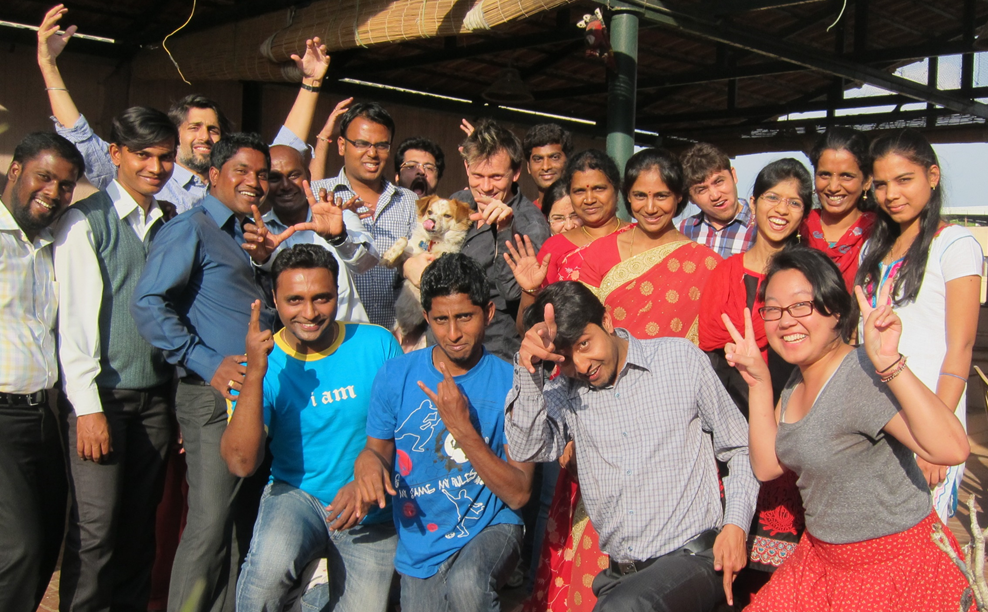Babajob wants to touch the lives of 100 million blue-collar workers in the next 10 years

Solutions for BoP customers adopt solutions from mainstream businesses though the problem may not be the same. That’s how Muhammad Yunus founded Grameen Bank, known also as the bank of the poor, in doing so he started the world Microfinance movement that won him the Nobel Prize for Peace in 2006. Sean Blagsvedt did something similar when founded Babajob.com, an informal employment exchange solution provider, also known as the LinkedIn for the poor. I know that probably right now you are thinking “this comparison is exaggerated”, but the potential for massive upheaval in the informal employment sector is huge.It began in 2005, when Sean was working in Microsoft Research India and a colleague presented him a study that was explaining how people move in and out of poverty. The study was showing that poor families everywhere often fall into poverty when major health calamities occur – if a father and primary income earner is a day laborer and loses a hand, his family may often become destitute. On the positive side, the study showed that poor families often left the poverty trap through income diversification i.e. they got other jobs. If a farmer started fixing tractors on the side or a young son got a better paying job in the city, eventually that extra income really did raise the real economic status of the family.
In that moment Sean got the idea: providing livelihoods for poor people was the solution. But, studying the market, he understood that the informal sector was completely unstructured: most people were hired because they knew someone that knew someone. And that was creating some problems: people working very far from their houses, or not getting the best job they could get. So Sean understood that this problem was already solved in the business sector by LinkedIn, and recruitment agencies. He just needed to invent a LinkedIn for the poor, but had to overcome all the problems created by low literacy, and a lack of knowledge to use computers.
To know more about Babajob, we spoke to Gourav Katyal, Head Product Management, Babajob.com, “In the beginning we started with a door to door strategy. We did it for the first 5000 people, while after that we moved to a broader campaign through mobile, advertising and internet that brought us to to have more than 500,000 job seekers,” says Gourav. Babajob’s motto is “Better jobs for everyone” and have extended their focus beyond poor people; now provide their service to entry level and senior jobs.
Most poor people in India are illiterate but they possess confidence they get the job they seek. ”One of the most important skills of job seekers is confidence. Evidence is showing us how people that are more confident to get a job they actually do,” tells Gourav. Another initiative that Babajob tried to implement for the illiterates is their partnership with skill development centres that are training people to help them find a job.
The biggest barrier that Babajob is facing is one of technology. Lot of poor people don’t have access to internet or don’t know how to use a computer, so they decided to take some smart solution to solve it. “Our mobile app is in four different languages, since a lot of people just speak their native language. Moreover we implemented a very successful SMS service, through which people receive job offers and can apply for them. Lastly we have also a call centre for the uneducated, where they are able to profile themselves even if they don’t know how to use a computer,” says Gourav.
Babajob thinks big. Their goal is to empower more and more poor and considering the scale of the problem and the scale of their activities they are doing it right. Behind their success there is a clear strategy “We don’t work anymore with a door to door approach, that’s not the best when your focus is scalability. We believe that technology is the best approach to scale up. For example Android is having a great penetration in the Indian smartphone market and that can help us a lot to increase our scale of operations,” affirms Gourav.
There are a lot of examples of people’s live changing having used the Babajob platform. Shiva, a 25 year old driver from Bangalore was unemployed, and found his first job, that pays well through Babajob Or Guna, from Chennai, who improved his career prospects going from sales to team management thanks to Babajob. But that’s just the beginning: “Currently we have a few million of users, we would like to have 100 million of users in 10 years, to create other 100 million successful stories” says Gourav.











